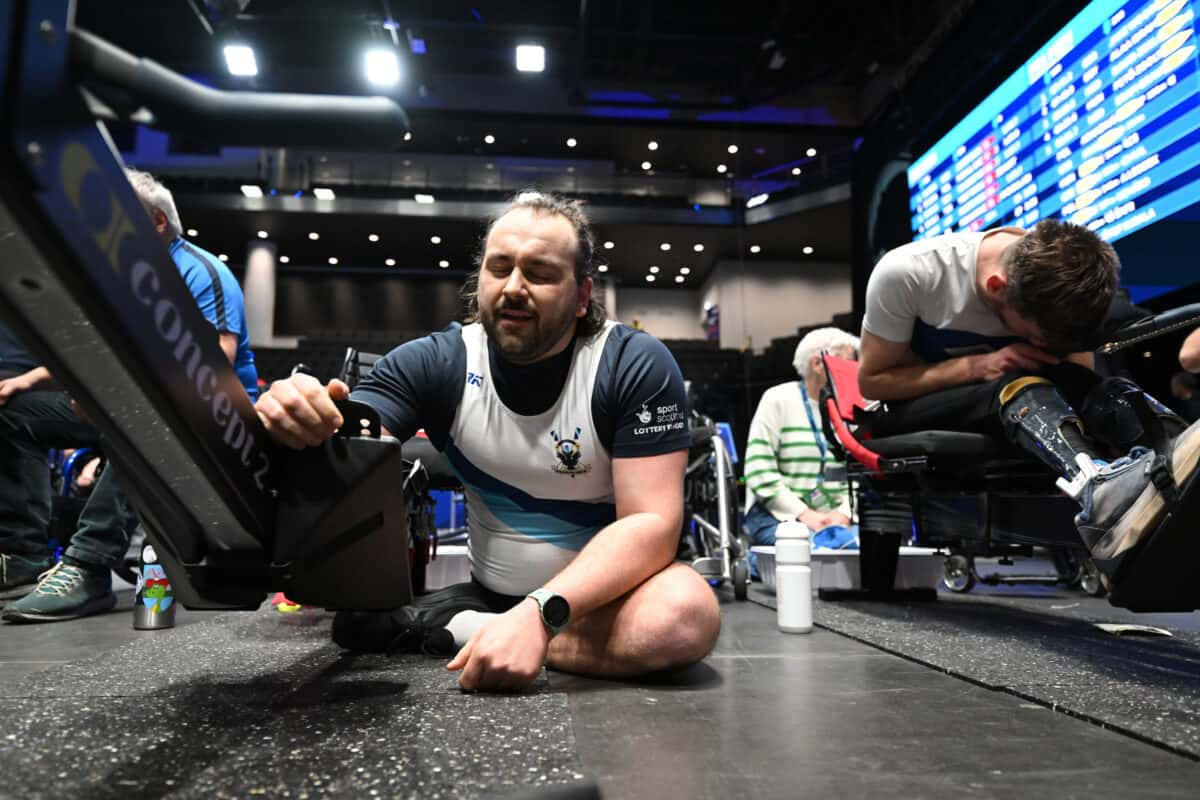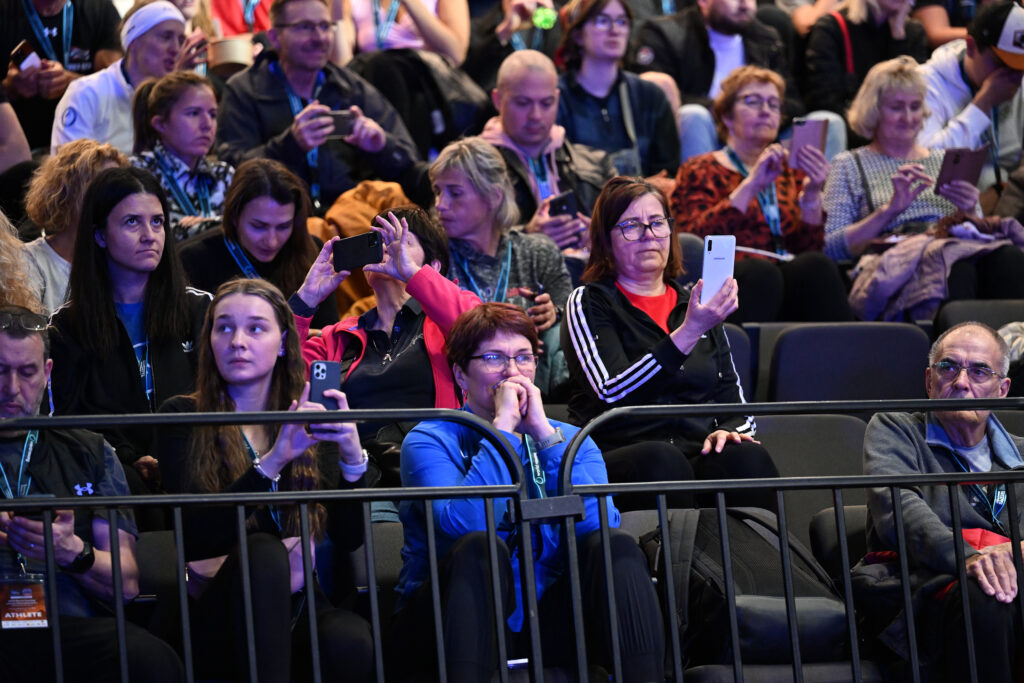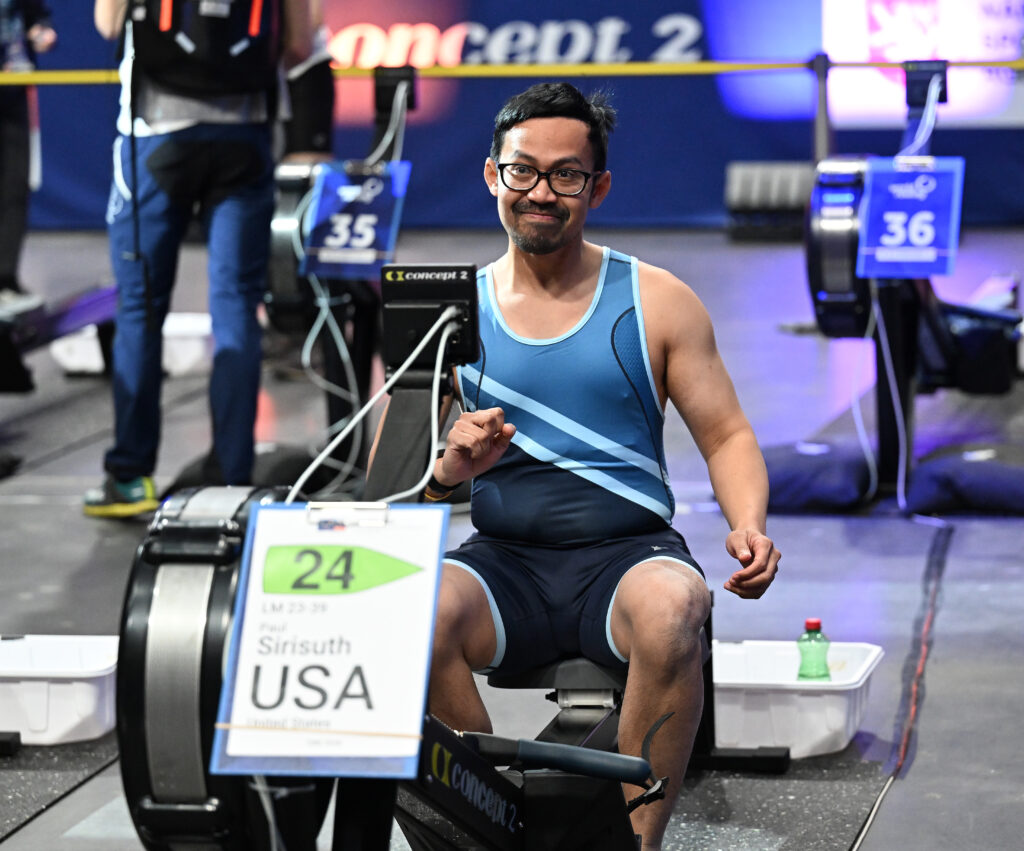
27 Feb 2024
Four inspiring stories of rowing to recovery
The value of sport as a vehicle for recovery is well-known. But the competitors at the 2024 World Rowing Indoor Championships, presented by Concept2, were proof of how taking part in sport – especially indoor rowing – can genuinely change lives.
For several of the more than 2,000 competitors, rowing has helped them recover from physical and mental health challenges and given them new hope for the future.
On the day that the UK went into lockdown, 23 March 2020, Briton Jake Woods found himself in hospital being told he had bone cancer and would need chemotherapy and the amputation of his right leg at the hip. At a similar time, men’s team relay competitor Elliott Awin was being fitted with a pacemaker after six years in and out of hospital due to heart problems.
And a year later, Awin’s teammate at the World Rowing Indoor Championships, Alistair Turpie, suffered a stroke at the age of just 28, losing his voice entirely.
“I had three months of quite heavy chemo before the amputation so during that time I was just writing lists and training my other leg and body to prepare myself for the drop-off after surgery,” explains Woods.
“I remember quite vividly there was one moment in the later stages of chemo where I got really ill, where I was sat up in bed, I’d been on a drip for four days, I couldn’t move, I remember just watching the Netflix Paralympics documentary ‘Rising Phoenix’.”
Woods was inspired by the documentary to go into para sport and use his new situation as an opportunity to push himself to the limits. After trying para swimming and para triathlon, he has now found rowing.
“This is the way that I process and deal with the trauma of that illness, and it’s how I’m moving on from it,” he says.
Turpie describes a similar thought process. “I lost my voice and had to learn how to speak again, that was two years of my recovery, and I paired my training alongside my recovery and I just fitted them hand in hand to where I am today,” he says.

All three athletes find the simplicity of indoor rowing a draw. Awin picked up Cross Fit after his heart condition forced him to give up a promising rugby career; after the defibrillator at his gym was used to save the life of a man in cardiac arrest, the gym organised a 24-hour row to raise money for the air ambulance, which Awin credits with giving him the rowing bug.
“Coming from rugby to Cross Fit you take the values that you had from rugby – the community spirit, the competitive nature, the ability to be a role model – and you move them over to something different. I found that I could replace that competitive nature with indoor rowing,” Awin says.
Turpie also came to indoor rowing through Cross Fit, explaining: “I fell in love with Cross Fit because it humbled me so badly. I’m a big strong guy and I couldn’t do gymnastics to save my life, but I was seeing all these small boys and girls beating me and I was like ah, why can’t I get as good as them.”
Both Woods and Awin have combined indoor rowing with on-water rowing. Woods is on the GBR para rowing development squad.
“I just like being outside – this isn’t the event for it, but I also like that the erg is a different beast to the water. It’s power, but it’s controlled power,” Woods says.
Awin decided that he would raise money for the British Heart Foundation through taking part in the World’s Toughest Row across the Atlantic. He completed the row in 44 days and one hour on 26 January – with his teammates signing him up to compete in the men’s team relay in Prague even before he had landed in Antigua.
“Obviously the erg was a massive training tool for me, spending 20 odd hours on the erg up until December last year when I set off across the Atlantic,” Awin adds.
“It’s a share of the pain, everyone shares that. What makes Concept2 special compared to other training partners is the consistency and ability to compare. You know where you are, and also the logbook and the community online that they’ve created is fantastic. You can compare yourself against yourself as well as the community and see if you’re jumping up or jumping down, and I love the fact that it runs with the rowing season, even though I’ve never been a rower,” he says.

Community is the factor that has helped American Paul Sirisuth the most with his mental health. Sirisuth’s father passed away 12 years ago, leaving him bereft, and he says a return to the sport – after he coxed at school – brought him back from the brink.
“Rowing came at a very personal place in my life when I didn’t really know how to move,” Sirisuth says.
But he found an indoor rowing gym and the community there helped him find himself again. “I’ve met so many amazing people, from Olympians, Paralympians, some of my amazing teammates that I got a chance this weekend for the first time to row with, and I honestly wouldn’t still be here without this sport. I don’t know where I would be, but I’m happy that rowing brought me to a place where I can feel this again,” Sirisuth says.
“Camaraderie and coming together is one of the most important parts of rowing, especially indoor rowing. We’re very new to the world and we want to show the rest of the rowing community that we’re here and that we have so many stories we want to share.”
He, as well as Woods, Awin, and Turpie are determined to continue their rowing – and indoor rowing – journeys.
“I’ve got a long way to go and this is just the start,” Woods promises.

